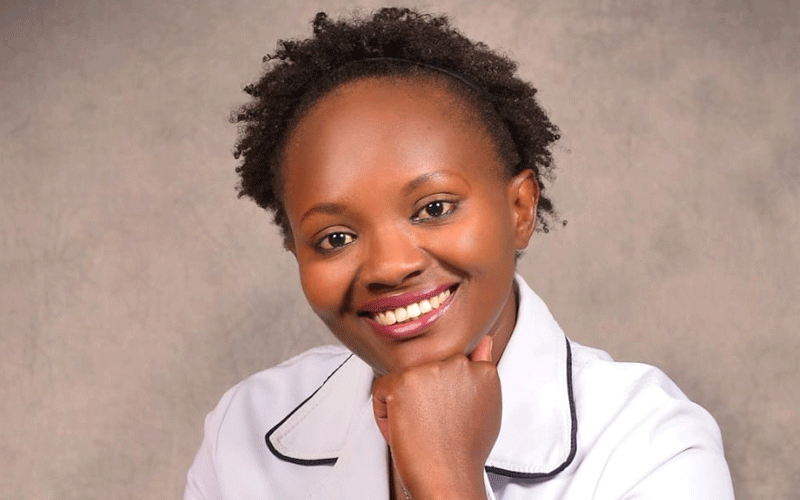Nurse’s ordeal fighting Covid-19 in foreign land

Evelyn Makena @evemake_g
Like soldiers on the battlelines, health workers have been on the forefront of fighting coronavirus, a disease that has left a devastating trail of destruction.
For months, thousands of nurses like Catherine Maina have worked long, intense hours trying to halt the spread of the virus that has so far claimed over 900,000 lives globally.
Catherine, a Kenyan nurse based in Scotland, has endured traumatic months caring for Covid-19 patients, watching some of her colleagues succumb to the disease and being diagnosed and eventually beating the virus.
High risk
When the first case of Covid-19 was reported in Britain towards the end of January this year, Catherine was still trying to settle in the new country after relocating from Kenya in July last year.
At the time, the Kenyan-trained nephrology nurse was stationed at a care home tending to dementia patients as she pursued her Bachelor’s degree in Nursing at the University of Derby, UK.
“Even as a medic, the threat of the novel virus was scary. Dealing directly with patients, I knew I was at a high risk of infection, but it never occurred to me that I could get infected,” she says in a Zoom interview.
Within the initial months of reporting the first case, Scotland was on and off different forms of lockdowns to curb the spread of the disease.
At the unit where Catherine worked, medics took extra precautions donning protective gear, constantly sanitising surfaces and flagging off any patient that had any form of chest infection for a mandatory Covid-19 test as per the country’s protocols,” she said.
However, in Mid-May Catherine was diagnosed with Covid-19. For days before the diagnosis she had experienced a dry persistent cough, headache, unbearable chest pains, a fever that had been hovering above 38.5 degrees Celsius and prickling sensation from her calf muscles all the way down to her toes. Initially, she had tried ignoring the symptoms, thinking she was imagining them.
“I had been away from my station for a few days after completing my shift. I returned on a Saturday morning and learnt that one of my patients had tested for Covid-19,” she says.
Her fears were confirmed and she took a test that turned positive.
With her symptoms classified as mild, Catherine was put on home-based supportive management care for 14 days until her symptoms cleared.
She describes the horror of being in a new country, confined in the house all alone as she battled a disease that tested her strength.
“For days, my throat had a burning sensation, my chest felt like there were heavy blocks placed on it.
I remember waking up several times at night and thinking this is how it feels to die,” she says.
With paracetamol prescription from a doctor for the headache, nasal spray to clear her blocked nostrils and Vitamin C to boost her immunity, Catherine’s symptoms slowly cleared off.
Like many medics on the frontlines, Catherine recounts the physical and mental toll fighting the disease has had on her.
“There have been really dark days, when I found myself weeping uncontrollably. The sadness of seeing lives lost and seeing patients helpless is unbearable,” she says.
That is in addition to facing stigma from fellow medics, especially after recovering from the virus.
Even after her symptoms wore off and she was given a greenlight to return to work, subsequent Covid tests all turned positive.
Doctors had warned that it would take time before the DNA remnants of the virus cleared from the body, hence she would continue testing positive even though the virus was gone.
“At work, I remember colleagues shying away from interacting with them for fear that I would infect them.
Being a new virus, it has been more of learning on the job even for medics hence such reactions,” she adds.
Catherine has been talking to a friend who is a counselling psychologist to get over the trauma. Blogging and hiking also help ease her distress.
A range of Covid-19 symptoms including fatigue and a congested throat have lingered for months even after being cleared of the virus in what the doctors have described as post Covid-19 syndrome.
Catherine tested negative for Covid-19 in August after undertaking multiple tests. The cough that had also persisted for a while has finally cleared.
The nurse currently working in the renal unit in one of the hospitals in Scotland notes that the country’s infections had dipped but have begun increasing.
The country’s infection rates had slowed towards the end of May and June going days without any reported cases but they have been rising since the end of July.
Scotland has had over 22, 000 Covid-19 confirmed cases with 70 new infections being reported on Monday this week.











